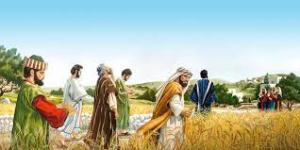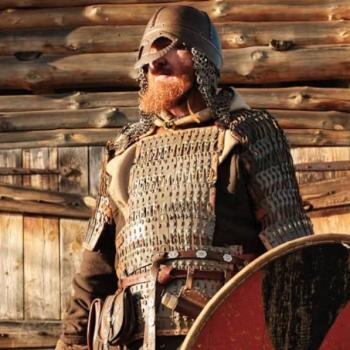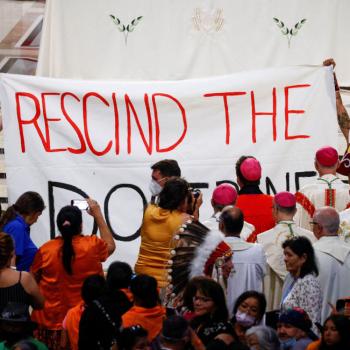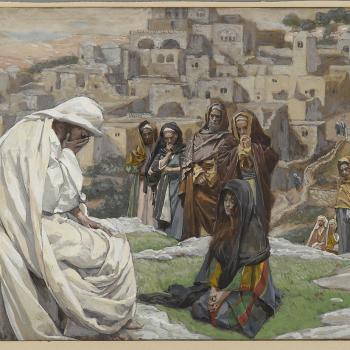
Many times in the Gospels and, presumably, many times in historical reality Jesus gets in trouble with authorities over Sabbath rules. Rather, perhaps, than getting in trouble like an inattentive schoolboy, Jesus seems to jump at any chance to stir things up. That, at any rate, is the hypothesis of this post. Jesus courts controversy over the Sabbath and subverts an oppressive social order in the process.
This is the seventh post on William R. Herzog II’s Jesus, Justice and the Reign of God. Earlier posts in the series are:
- The Historical Jesus and the Transcendent God in the Work of William Herzog
- Context Group Continues the Long History of Witnessing to Jesus
- Jesus Heals a Paralytic and Opens a Temple-Free Zone of Grace
- The Temple, Jesus, and the Little Traditions of Village Life
- A Rich Man Follows All the Old Rules. Or Does He?
- The Tradition of the Elders or the Mercy of God
Incidents of Sabbath controversies that the Gospels report include shucking grain, healing a man with a withered hand, healing a bent woman, healing a man with dropsy, and an exorcism – all on the Sabbath. Whether these things actually happened in Jesus’ life is contested, but Herzog leans more than many others toward their authenticity. The first of these incidents, in which the disciples break a Sabbath rule on their way through a grain field, is the subject of this post.
Shucking grain in plain sight – a deliberate provocation? (Mark 2:23-28)
One Sabbath he was going through the grain fields; and as they made their way his disciples began to pluck heads of grain. The Pharisees said to him, “Look why are they doing what is not lawful on the Sabbath?”
And he said to them, Have you never read what David did when he and his companions were hungry and in need of food? He entered the house of God when Abiathar was high priest, and ate the bread of the Presence, which is not lawful for any but the priests to eat, and he gave some to his companions.”
Then he said to them, “The Sabbath was made for man, not man for the Sabbath. So the Son of Man is lord even of the Sabbath.
I have wondered at the disciples’ behavior in this incident, even more than at the Pharisees’. Did they forget last night that tomorrow would be the Sabbath Day? Did no one follow the normal procedure of preparing Sabbath meals in advance? Couldn’t they have gone hungry once, like law-abiding Jews? You could take this as evidence that the story never really happened and that it was the early Church illustrating a point. I concluded, however, that Jesus may have orchestrated an act of civil disobedience in plain sight of some Pharisees. If the Pharisees could see the disciples, the line of sight went both ways. The disciples knew they were being watched and did “what was unlawful on the Sabbath” anyway.
The question of historicity
Herzog also considers whether this event may have actually happened in Jesus’ life (p. 185-6). Some scholars claim that geographically the scene is impossible. Sabbath rules allowed only a half-mile walk, or 1000 steps. One interpreter wonders:
Are we to imagine [the obsessively observant Pharisees] out for a Sabbath stroll in the country, where they happen to spot the disciples just as they are plucking a few heads of grain? (This is from Arland J. Hultgren, Jesus and His Adversaries, p. 114)
Hultgren, further, claims to see a process of putting this story together in the early Church. It starts with a saying of Jesus – “The Sabbath was made for man, not man for the Sabbath.” The section on David eating the forbidden “bread of the Presence” could have arisen in early Christianity’s debates with Judaism. It would have served to justify Jesus’ daring statement and their less than rigorous Sabbath observance. Finally, someone composes the story of the episode in the grain field to give a context to Jesus’ saying.
Opposing this scenario, Herzog first clarifies the geography of Galilean village life. So as not to waste any precious land, villagers planted their fields right up to village borders. Paths led through these fields from one village to another. The Pharisees needn’t have traveled out of town at all to see the disciples approaching on some such path. If, as is entirely possible, the synagogue was just an open field where villagers met, the Pharisees needn’t even have left the synagogue.
Jesus brings up an unusual story.
The Pharisees have issued their challenge: Why are your disciples doing work on the Sabbath? Jesus must respond. He does so with a mild dig – “Have you never read” – and a story the Pharisees would not have expected. David, fleeing from murderous Saul, and his men (supposedly, but we’ll see about that later) eat some holy bread. This story has nothing at all to do with work or the Sabbath.
If the story has any relevance to Jesus’ situation, then David must have broken some rule, but what? In Jesus’ telling there was a rule breaking – David and his men ate the forbidden bread of the Presence. (Supposedly forbidden, but we’ll get to that later too.) Jesus appears to make an outrageous comparison between his hungry disciples on a Sabbath morning and Israel’s most loved king in desperate flight from Saul.
Jesus plays to the crowd
In an honor confrontation victory is a matter of winning over spectators more than getting one’s adversary to concede a theological point. (The latter was never going to happen anyway.) But stories of royal figures, or “the one percent” as we’d say today, don’t fare well among the poor. We need a closer look to see how David’s story engages the crowd of village peasants. Jesus picks up the story (from 1 Samuel 21:1-6) at a low point in a most-loved king’s career.
David is, in Herzog’s words, “a coyote figure who lives by his wits while others seek to destroy him.” (p. 188) (A Galilean villager can warm to that figure.)
David is a trickster like heroes in many popular stories. And the trickery in David’s story starts with no lesser figures than the prophet Samuel and God almighty. You see, David really is an anointed king, but Saul still has all the power. God has told Samuel to anoint a son of Jesse. God tells Samuel to let on that he’s just going to Jesse’s place to offer sacrifice. If Saul finds out the real reason, he’ll probably kill Samuel.
Some time later David is on the run from Saul. He has gotten a warning by secret sign from his best friend, who happens to be Saul’s son Jonathan. David makes his way to Nob and asks the local priest, whose name is Ahimelech, for five loaves of bread. He needs it for his men, whom he’ll be meeting shortly. To reassure the priest, who knows about Saul’s temper, he makes up a story about being on a secret mission from Saul himself.
More lies
The only bread on hand is the holy bread of the Presence. Ahimelech says David can have some as long as his men have “kept themselves from women.” David insists that they have. Conveniently, that lie is almost a truth. David doesn’t have any men so, of course, no women have touched them.
David won’t be meeting up with anyone except some Philistines in the town of Gath. There his reputation as a killer of Philistines is well known. To protect himself David, a consummate actor, pretends to be mad, foaming at the mouth in front of King Achish.
Eventually David gets his army. First his brothers and then “everyone who was in distress, and everyone who was in debt, and everyone who was discontented” gather around. (1 Samuel 22:2)
These folks, including the ones in debt, are a lot like the villagers overhearing Jesus’ argument with the Pharisees. Practically every element of this story strikes an agreeable chord with story-loving villagers in Nazareth.
Credible history?
Jesus has used a small part of one of the crowd’s often-told stories. Not so well-known or well-liked, I think, by Jesus’ big-city Pharisee adversaries. Jesus repeated David’s lie about having a posse on hand as if it’s true, and they don’t seem to have caught it. (I admit that I didn’t catch it either when I wrote about this story the first time in an earlier post.)
The Pharisees also didn’t catch Jesus in some mistakes he made. Jesus misnamed the priest of Nob. He’s Ahimelech, not Abiathar; Abiathar is Ahimelech’s son. And it wasn’t true that only priests could eat the holy bread. The men just had to keep themselves from women.
I can imagine mistakes like those creeping into the oral telling and retelling of a favorite village story. And I can see Jesus learning the story with those mistakes in it. It would be less likely to come from the pen of a Christian scribe with 1 Samuel at his fingertips. Unlike many scholars Herzog tells the story of this confrontation between Jesus and the Pharisees as if it really happened. Jesus’ mistakes, I think, add to the credibility of Herzog’s view.
A subversive story
Jesus follows the telling of his David story with a first-century Palestinian version of “Rules are made to be broken.” In Jesus’ words, “The Sabbath is made for man, not man for the Sabbath.” Since David didn’t break any Sabbath rule, Jesus is really implying, more generally: “Rules are made for people, not people for rules.”
Pharisees are among the most scrupulous of rule followers. They didn’t make the rules for the most part. That was for priests and scribes interpreting the written Torah. But Pharisees appointed themselves unofficial enforcers, or at least encouragers, of obedience to rules. This particular group may have been on a mission from Jerusalem to monitor village compliance with oral law. Villagers, of course, have their own moral code that works for poor people on the periphery of society. They exist in some tension with the center of their religion in Jerusalem.
Jesus evoked this element of tension in the villagers’ character with his story about David. Herzog, summarizing, says the Pharisees
… have forgotten that the Sabbath was God’s provision for restoring human life and renewing human community. But they have turned the Sabbath into an endless series of tasks required to maintain purity. This system turns people into the objects of their system, rather than … the subjects of God’s creative caring. (p. 189)
“So the son of man is lord even of the Sabbath.”
If God’s people are subjects, not objects, for God, then they have some authority over their own lives. That is what the concluding saying about lord of the Sabbath may point toward. But the saying is ambiguous. “Son of man” can have different meaning. The saying itself may not be from the historical Jesus. Herzog gives three meanings of “son of man” and three ways the saying fits — “remarkably well” — the controversy over the Sabbath. (p. 190)
- “Son of man” may be Jesus’ way of referring to an ordinary person. If so, then he is saying “an ordinary person can create and change the rules that govern the observance of the Sabbath.” That assumes, of course, that the person is “brokering God’s covenant mercy and love.” Perhaps that’s what the disciples were doing. This saying, then, puts disciples and village peasants on the same footing as Jerusalem officials. Villagers “can work things out in their own context.”
- “Son of man” could be a self-reference to Jesus himself in the third person. Similarly, we might say, “Yours truly.” Then “Jesus is identifying his role as God’s broker of this new way of doing things.” Probably, Jesus is doing that in any case.
- Or “son of man” may mean, in Jesus’ telling, one like me. Then “Jesus is claiming the same role for his disciples and others who follow him.”
Herzog doesn’t get any more definite than this about the historicity of Jesus’ last saying. He does favor the basic story as historical. But he doesn’t push hard on that, suggesting it’s a good candidate for further discussion. (p. 190) Regardless, the Bible story does illustrate a conflict over Jerusalem’s centralized and oppressive authority versus God’s justice. That Jesus often had such conflicts is Herzog’s argument through two books. He makes that argument well. And Jesus pushes hard for God’s justice and the needs of the village poor versus a social order that prioritizes the interests of a powerful, central elite.












